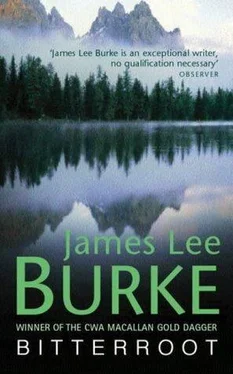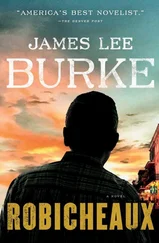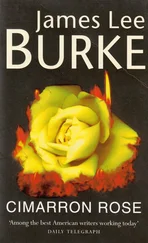She tried to think of the farm where she had lived as a little girl down by Matagorda Bay. The pasture was carpeted with bluebonnets in the spring, and a family of owls lived in a desiccated red barn behind the house, and at sunrise she would look through the window and see the owls gliding out of the woods to a hole in the barn roof, where they squeezed inside and disappeared just as the pinkness of the morning broke across the countryside. She came to associate the owls' flight into darkness with the fine beginning of a new day.
She thought of Gulf storms and the way the rain marched across the bay and danced on the watermelons in her father's fields. She saw the windmill ginning in the breeze and water pumping into the horse tank and the hard blueness of the sky and the moss straightening in the live oak that shaded one side of their house. She saw a sky writer spelling out the name of a soda pop, banking and climbing straight up into the dome of heaven itself, laying out white smoke one thick letter at a time. Then the letters lost their rigidity of line and broke into curds, like buttermilk, and her father told her that was the wind blowing across the top of the sky, and she wondered how wind could blow in a place where no trees grew.
She thought of all the earth's gifts that lived in the air, the smell of sea salt on a hot day, the way clouds transformed themselves when you lay in the grass and looked up into the heavens, the ozone that lightning gave off, the clatter of palm fronds, the red and gold leaves that cascaded out of the trees in the fall.
In her mind's eye she saw the mother owl returning from the woods again, gliding on extended wings toward the hole in the barn roof, its stomach gorged from feeding all night. The return of the owl always meant the beginning of a new day, didn't it, one filled with promise and expectation? But this time the owl didn't squeeze back through the hole in the roof. Instead, it flew directly at her face, its talons open.
It grew in size and shape and texture, its wings leathery, enormous in breadth now, flapping in the sky, blocking out the sun. The flapping sound was so loud now it droned in her ears and made the earth around her head tremble.
So this is the way it comes, she thought, and she gagged on her own saliva and felt the hose slip loose from her mouth.
That's when a pair of hands pried a flat stone loose from above her forehead and wiped the dirt from her face and pulled the tape from her eyes and removed a sliver of rock from her tongue. "Billy Bob?" she said.
Then she was being pulled from her grave by each arm, like a crucified figure being lifted from a cross.
"You're going to be all right, lady," the sheriff said. "Don't worry about a thing. We'll have you at the heliport and into St. Pat's in ten minutes."
She stared into the sunlight and at the silhouettes above her and at the humped shape of a helicopter by a stand of ponderosa that grew out of rock. "Billy Bob?" she said.
"Yes," I said.
But she looked down at the river bursting against boulders in the channel below us and at the iridescent spray on the canyon walls, then at the snow melting on the fir trees and the brown hawks wheeling in the sky and the long green roll of the northern Rockies and she could not find any other words to speak.
The sheriff sat with me in the waiting room at St. Patrick's Hospital. He watched me walk up and down.
"I'll bring Dixon in. You got my word on it," he said.
"Then what?" I said.
"She's never heard his voice before. I'll find a half dozen other peckerwoods and do a voice lineup."
"She marked him with the cigarette lighter. That should be enough."
"It's a start. Why don't you relax? You remind me of a lizard panting on top of a hot rock."
"You'd better get him off the street, Sheriff."
"I think your mama put you outdoors before the glue was dry, son. I really do," he replied.
A half hour later, after the sheriff had gone, Temple walked out of the emergency room. Her clothes were wrinkled and grimed with dirt, her hair in disarray.
"Give a girl a ride?" she said.
"You okay?"
"Sure," she said.
"Let me talk to the doctor first," I said.
She stepped close to me and leaned her forehead against my shoulder. I could smell the damp odor of earth and decayed leaves in her hair and clothes. "Take me home, Billy Bob," she said.
I opened the truck door for her and drove down Broadway toward her motel. The sky was blue, the snow melted from the trees now, the streets glistening and wet in the sunshine. It was a beautiful day, but Temple's eyes were disconnected from the world around her.
"Say it again. How did y'all find me?" she said.
"Somebody at the health club saw a man drive your Explorer away. I called the sheriff and he put an APB on it. A highway patrolman called in and said he'd seen a vehicle like yours headed west through Alberton Gorge. The sheriff got a helicopter and we took off."
"You could see the Explorer from the air?"
"Yeah, that's about it."
Her gaze was turned inward, as though she were adding up numerical sums.
"If they'd parked the Explorer in the trees, y'all would have flown right over me," she said.
"I guess we would have," I said.
She took a breath and pushed her hair back off her forehead.
"I don't think I'm going to sleep for a long time," she said.
I walked with her into her motel room, then left while she showered and changed. I drove down to a fast-food restaurant and ordered fried chicken and french-fried potatoes and a milk shake to go. When I returned to the motel, Temple opened the door on the night chain, her.38 hidden behind her leg.
"It's only me," I said, and tried to smile.
She slipped the chain and let me in and placed her revolver on a table by the door. She had put on makeup and a fresh pair of jeans and a blouse with flowers on it, but her eyes would not meet mine and her breath hung in her throat, as though the air were tainted and might injure her lungs.
"Don't you want to eat something?" I asked.
"Not now."
"Those tar mules down in Coahuila set a field on fire with me in the middle of it," I said. "I would have burned to death if L.Q. hadn't pulled me up on his horse. I still have nightmares about it. But that's all they are, nightmares."
She sat down on the edge of the bed and looked into space.
"Why did they give me the air hose? Why did they want to keep me alive?" she said.
"To make both of us suffer."
"I spit it out the first time. The second time I let him put it in my mouth. That bastard won, didn't he?" she said.
"No. They're cowards. Their kind never win," I said.
But my words were useless. She squeezed her temples and lowered her head, her eyes shut. I sat beside her and placed my arm around her and felt her shaking, as though an incurable coldness had invade her body.
I STAYED with Temple until she fell asleep, then covered her up and left a note to the effect that would return later in the day.
I drove west of town, through green pastureland and small horse ranches with new red barns am white fences, then up the dirt road that led to Terry Witherspoon's shack above the Clark Fork River. I parked in the clearing and banged on his door and looked in his windows, then walked around back.
A trash fire was burning in a rusty oil barrel. The thick curds of black smoke rolling from it were laced with an eye-watering stench. I found a rake in a tool-shed and kicked the barrel on its side and combed out the contents.
In the tangle of wire and cans and tinfoil he hadn't bothered to separate out from his ignitable trash were plastic bottles of motor oil, animal entrails and strips of fur, and a blackened roll of pipe tape.
Читать дальше












